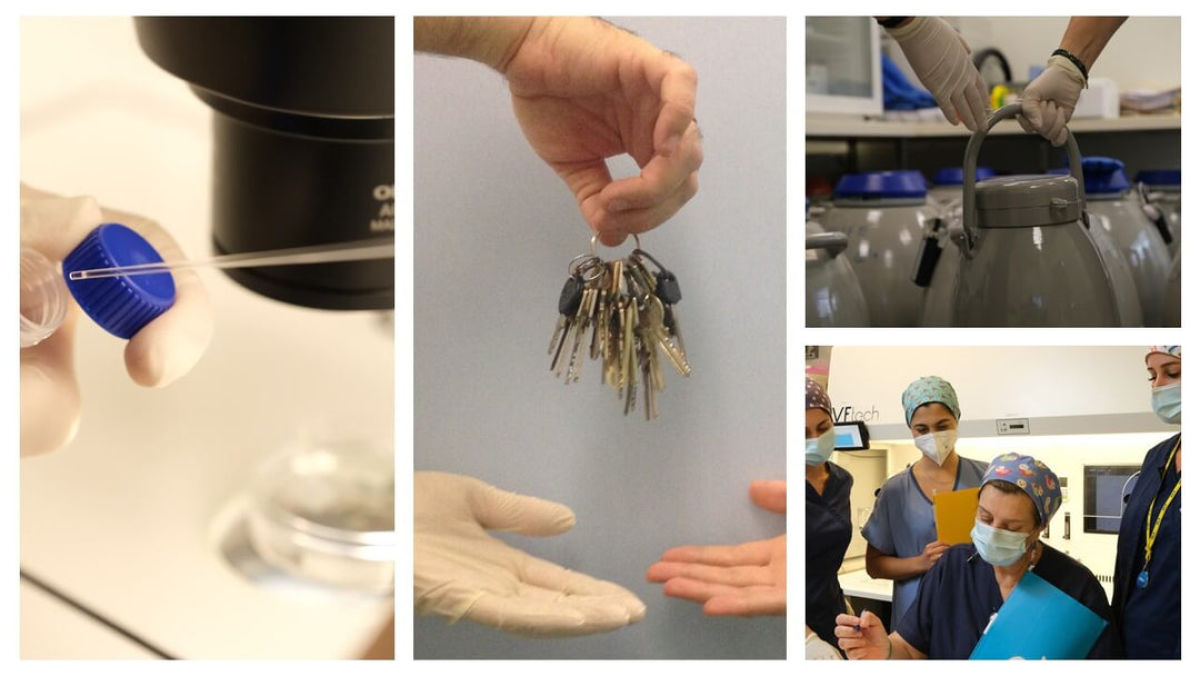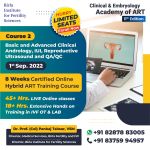
IVF NewsNews: US Supreme Court's reversal of Roe v Wade abortion law would endanger IVF
Javier Bautista 25 June 2022
Changes to US abortion law could have wide-ranging impacts on fertility treatment including IVF and preimplantation genetic diagnosis (PGD). The 1973 'Roe v Wade' case established abortion as a constitutional right, however, the current Supreme Court has been discussing overturning this decision, which would allow individual states to restrict or ban abortion. Several states have 'trigger laws' in place that would come into effect immediately if Roe v Wade is overturned, and some of these confer rights or personhood onto embryos or fetuses. 'If Roe v. Wade is overturned, trigger laws can go into effect immediately that recognise an embryo as a person – [and] if a fertilised egg is considered a person, anti-abortion laws could make it illegal to discard embryos,' Dr Lucky Sekhon, a New York-based infertility specialist told Forbes. Standard IVF protocol involves collecting and fertilising as many egg as possible, to maximise the number of healthy embryos. These can then be transferred to the uterus ideally one at a time, and the others are frozen for use in future transfers or for subsequent pregnancies. If embryos are granted legal rights, there may be opposition to allowing any fertilised eggs to be stored or discarded, meaning that eggs will have to be frozen and then fertilised in small batches, which is likely to be less efficient and more expensive for patients. Preimplantation genetic testing may also be affected if discarding the aneuploid embryos or those carrying harmful mutations is prevented. This could leave families who need PGT-M to avoid passing on serious genetic conditions with few options. Finally, embryo freezing could also be affected. Some states may try to ban any process deemed 'harmful' to the embryo once it is created – including freezing as a small proportion (less than five percent) of embryos do not survive freezing and thawing. 'This can lead to transferring all of the embryos created at the same time, which increases the chance of having multiples (twins, triplets, quadruplets or more), which are high-risk pregnancies,' obstetrician gynaecologist Dr Heather Irobunda told Forbes. The result is likely to be more patients travelling to states without these laws for fertility treatment and facing increased costs and inconvenience as a result. Sources and References
[ Full Article ] News: Whole exome sequencing of mother could predict risk of creating embryos with aneuploidy
Dr Malena Daich Varela 25 June 2022
Variants in three genes have been linked to an increased risk of a woman creating aneuploid embryos while undergoing IVF and used to create a risk score using machine learning. Embryonic aneuploidy describes an embryo with an abnormal number of chromosomes. This abnormality can lead to increased risk of miscarriage. The risk of producing aneuploid embryos increases with older maternal age as the eggs are more likely to be aneuploid. However, little is known about the cause of egg aneuploidy so researchers designed a study to determine if studying the genome of the mother could help indicate the risk of embryonic aneuploidy. Knowing this could help couples determine their chances of successful IVF with their own eggs, authors of the paper published in Human Genetics argued. Dr Jinchuan Xing, research lead author and associate professor at the Rutgers School of Arts and Sciences, New Brunswick, New Jersey, said: 'The goal of our project was to understand the genetic cause of female infertility and develop a method to improve clinical prognosis of patients' aneuploidy risk. Based on our work, we showed that the risk of embryonic aneuploidy in female IVF patients can be predicted with high accuracy with the patients' genomic data. We also have identified several potential aneuploidy risk genes.' First, researchers analysed the rate of embryo aneuploidy in women undergoing IVF in order to determine their individual risk. They selected 281 women of European ancestry from two genomic datasets. They then them into two groups: a low rate group if they had less than 30 percent rate of aneuploidy in their embryos and a high rate group if it was over 50 percent. Then they analysed the women's genomic data to determine whether there were any genetic variants linked to a higher risk of creating embryos with aneuploidy. This flagged up 23 genes associated with meiosis, which researchers used to develop a risk score for embryonic aneuploidy. They then developed machine learning models to test whether or not presence of these genetic variants could be used to determine unseen women's risk of creating embryos with aneuploidy using a different cohort to test their model. Variants on three genes MCM5, FGGY, and DDX60L were found to contribute the most to the model's predictive power, and could be used as future targets in diagnostic or therapeutic approaches. Researchers said the risk score could be more useful than just looking at maternal age, as aneuploidy rates can vary considerably between individuals. 'I like to think of the coming era of genetic medicine when a woman can enter a doctor's office or, in this case, perhaps, a fertility clinic with her genomic information, and have a better sense of how to approach treatment. Our work will enable such a future.' Dr Xing said. Sources and References
[ Full Article ] News: COVID-19 vaccines do not induce autoimmune reaction that causes infertility
Semyon Bodian 25 June 2022
Neither mRNA nor inactivated virus COVID-19 vaccines cause changes to syncytin-1 antibody levels in women of reproductive age, researchers at Yale School of Medicine, Connecticut, have shown. Claims made online that COVID-19 vaccines could affect fertility due to the induction of syncytin-1 antibodies, which inhibit placental formation, have been blamed for low vaccine uptake rates among pregnant women. Now a study designed specifically to tackle this claim has found no difference in syncytin-1 antibody levels in women who had been vaccinated against COVID-19 compared to those that had not. 'The findings provide further evidence that existing mRNA vaccines are safe for pregnant women and those planning to become pregnant' said Professor Akiko Iwasaki, Sterling professor of immunobiology and of molecular, cellular and developmental biology at Yale University Claims that COVID-19 vaccination could cause an immune reaction against syncytin-1, a protein responsible for placenta formation during embryo formation, originally appeared after a letter was sent to the European Medicines Agency asking it to stop emergency authorisation of mRNA vaccines. It included an assertation that there was no evidence that antibodies against spike proteins, which might be structurally similar to syncytin-1 antibodies, wouldn't impair the formation of the placenta and prevent pregnancy. To examine this claim Professor Iwasaki and her group compared the levels of syncytin-1 antibodies in two independent cohorts of women under the age of 60: one group vaccinated with Pfizer BioNTech or Moderna mRNA vaccines or the CoronaVac inactivated virus vaccine, and the other unvaccinated. They measured syncytin-1 antibodies before vaccination, between vaccines and after vaccination. No elevated levels of the antibody were observed in the vaccinated women compared to those unvaccinated. To counter claims the COVID-19 vaccine can affect fetal development, the authors compared the size, weight and presence of congenital defects of mice born to female mice vaccinated early on in their pregnancy, with those born to unvaccinated mothers. No overt maternal illnesses were observed in either the vaccinated or unvaccinated mice while there were no discernable differences in fetal size and weight of mice born to vaccinated or unvaccinated mothers. These findings backed-up existing evidence showing the COVID-19 vaccine has no effect on fertility or miscarriage rates. 'Unvaccinated pregnant women are at increased risk for severe consequences of COVID-19 infections, including hospitalisation and intensive care stays than unvaccinated pregnant women, and face increased risk of delivering a preterm or stillborn infant.' Professor Iwasaki said. Sources and References
[ Full Article ] Webinar: Legacy II
International IVF Initiative 25 June 2022

The second part of the webinar topic where embryologists and stake holders in the IVF industry talk about the current need for embryologists globally. Embryologist moderators Giles Palmer, Keshav Malhotra, Dr. Tony Anderson and Eva Schenkman discussed again recruitment, training and talent management of embryologists, building on the comments of the previous webinar and looking at other markets in the world such as India and Australia. Elina Roumian spoke on her career path and the current situation of the profession of clinical embryology in Australia while TJ Farnsworth talked about the mobility and the opportunities to relocate for clinical embryologists. A video montage of opinions on the state of the profession, the changing role of the embryologist as automation approaches by owners of training academies from around the world was aired. View at https://ivfmeeting.com/products/session-98-legacy-part-2 [ Full Article ] Webinar: LEGACY I
International IVF Initiative 25 June 2022

Embryologists and stake holders in the IVF industry talk about the current need for embryologists globally. They discuss the changing challenges and demands of the embryologists, the demographics of the people working in an IVF laboratory and ways to retain, train and recruit embryologists into the workforce as more of the veteran embryologist retire. An introduction by Eva Schenkman sets the scene for current demands in the workforce, while CEO of the Inception group of clinics, TJ Farnsworth, describes ways that a clinic can manage talent and plan for continuation of services through succession. UK Embryologists Andrew Thomson and Alison Campbell describe the career routes and the challenges faced by trainee embryologists in the UK and a unique scheme to increase the number of trained embryologist by alliances with UK IVF clinics with Universities. Together, the speakers and moderators formed a round table discussion centred around the recruitment and training of new embryologists with live questions from attendees of this webinar. View at https://ivfmeeting.com/products/session-97-legacy-part-1 [ Full Article ] News: Freezing eggs when younger is better for women delaying motherhood
Francesca Gavins 25 June 2022
Older women have a better chance of pregnancy from IVF with previously frozen eggs compared to freshly collected eggs, according to a new study. Research from New York University (NYU) examined the rates of live birth from women using their own frozen eggs in fertility treatment. They found that success rates were comparable to IVF results for patients using freshly collected eggs, when matched by age at egg collection. 'Our findings shed light on the factors that track with successful births from egg freezing,' said Dr Sarah Druckenmiller Cascante from NYU Langone Fertility Centre. 'A better understanding of the live birth rate from egg freezing for age-related fertility decline is necessary to inform patient decision-making.' The study was a collaboration between the Langone Fertility Centre and the NYU Grossman School of Medicine, who reviewed data from 543 patients who froze and subsequently thawed their eggs to use in treatment between 2005-2020. The patients had an average age of 38 at the start of treatment, and 42 when the eggs were thawed for use. Between them they underwent 800 egg freezing cycles, 605 egg thaws, and 436 embryo transfers. As a result, 211 babies were born – a birth rate of 39 percent per patient, and some patients had more than one child. The age at the time of the freezing eggs and the number of eggs thawed were predictive of the live birth rates: no live births were seen in patients whose eggs were collected at age 44 or older. Women who froze eggs before they were 38 and thawed at least 20 eggs had the highest chance of a live birth at 70 percent. For patients who met one but not both criteria, it was 50 percent. This compares to a live birth rate of below 20 percent in women aged 40 who use their own freshly collected eggs. Because the number of eggs thawed was a predictor of success, patients who had two cycles of egg collection were more likely to have a successful pregnancy. The length of time the eggs were frozen did not affect success rates. 'Importantly, our study is based on actual clinical experience,' said Dr Cascante, 'rather than mathematical modelling with limited data, which is most of what has been published on the chance of births from egg freezing thus far.' The authors added that further studies are needed in patients below 35 years and with a larger number of patients across different centres and geographical areas. The results were published in Fertility and Sterility. Sources and References
[ Full Article ] News: HFEA reports on IVF access during the COVID-19 pandemic
Clíona Farrell 25 June 2022
NHS-funded IVF cycles were slower to resume on average than privately-funded treatments after the mandatory closure of all UK clinics due to the COVID-19 pandemic. Fertility treatments were suspended by the government three weeks into the first national lockdown due to the impact that COVID-19 was having on the NHS, and the then-unknown risks of the virus to pregnant women. A new report from the Human Fertilisation and Embryology Authority (HFEA) shows that NHS clinics were slower to resume, with only 34 percent reopening on the first permitted day, compared to 83 percent of private clinics. 'Many patients wanted to begin or continue fertility treatment during the pandemic and clinic staff went above and beyond to offer safe care,' said HFEA chair Julia Chain. 'However, COVID-19 related measures did impact some patients, as many appointments had to be provided remotely and those that were in person, were restricted in attendance to just the patient.' Fertility clinics were told to close in April 2020 and could apply to reopen from 11 May if a safe environment could be created for patients and staff. Total NHS-funded IVF treatments fell by seven percent in 2020, compared to 2019. Reasons that NHS treatment was more seriously impacted may include staff redeployment to other areas of the NHS, and that many NHS fertility clinics are located within hospitals treating COVID patients and may have had to take extra precautions around social distancing. The new report shows that IVF cycles in patients between 18-34 years decreased more than that of patients aged 40-50, likely due to clinics prioritising older patients as the probability of successful treatment decreases with age. Those in heterosexual relationships experienced a greater decrease in IVF cycles in 2020 compared to those in same-sex relationships. This may be because of the larger proportion of NHS-funded fertility treatment for heterosexual couples. Embryo storage was the only area in which an increase over 2019 was observed. The report echoes findings of the HFEA patient survey published by the HFEA last month which found that NHS-funded patients were twice as likely to report experiencing delays in starting IVF treatment than privately funded patients. 'These figures confirm our fears that the double whammy of poor NHS funding and the COVID pandemic had a devastating impact on UK fertility patients,' said Sarah Norcross, director of the Progress Educational Trust. 'Privately funded IVF cycles not only matched but exceeded 2019 levels by mid-2020, whereas NHS-funded cycles had yet to return to 2019 levels by mid-2021. It is yet unclear whether the situation has improved since then.' Sources and References
[ Full Article ] News: Course Name: Basic and Advanced Clinical Andrology IUI, Reproductive Ultrasound, and QA/QC.
Dr. Prof (Col) Pankaj Talwar VSM 24 June 2022

Course Name: Basic and Advanced Clinical Andrology IUI, Reproductive Ultrasound, and QA/QC. 𝙁𝙚𝙬 𝙎𝙚𝙖𝙩𝙨 𝙇𝙚𝙛𝙩! 𝙒𝙝𝙖𝙩𝙨𝘼𝙥𝙥 𝙤𝙣 :- https://wa.me/918287883005 👉🏻Enhance your Clinical Skills in Virtual Ambience with I-Ceat - Clinical & Embryology Academy of ART and Birla Institute for Fertility Sciences! 👉🏻 #𝙊𝙣𝙡𝙞𝙣𝙚 𝘾𝙤𝙪𝙧𝙨𝙚 Starting 𝙛𝙧𝙤𝙢 1st Sept. 2022 👉🏻 45+ Hrs. Live Online Classes 👉🏻 18+ Hrs. Extensive Hands-on Training in IVF OT & LAB 👉🏻 Few Seats Left! 👉🏻 Register Now!!! Dr. Prof.(Col) Pankaj Talwar, VSM Director, Medical Services, Birla Fertility & IVF Director, Birla Institute for Fertility Sciences
𝙑𝙞𝙨𝙞𝙩: www.i-ceat.com 𝙁𝙤𝙧 𝙎𝙪𝙥𝙥𝙤𝙧𝙩, 𝙒𝙝𝙖𝙩𝙨𝙖𝙥𝙥 𝙉𝙊𝙒!!!https://wa.me/918287883005 #MD #MS #IVFCourses #onlinecourses #onlineivfcourses #usg #et #OPU #iceat #OBG #DGO #gynaecologist #obstetrics #certification #semenanalysis #ART #ARTTraining #EmbryologyTraining #Andrology #DrPankajTalwar #birlafertilityandivf #BirlaFertility [ Full Article ] Conference: ACE 2022 Conference
ACE 2022 21 June 2022
Webinar: RBMO VI
International IVF Initiative 06 June 2022

Tuesday, 7th June at 3pm EST, 8pm UK, 9pm CET [ Full Article ] |